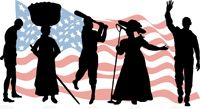H. Rap Brown
H. Rap Brown was born Hubert Geroid Brown in Baton Rouge, Louisiana, in 1943. He earned the nickname "rap" in high school for excelling in the "insult game" known as "the dozens." In 1962, his brother Ed, a student at Howard University in Washington, D. C., introduced H. Rap Brown to a student civil rights group called the Nonviolent Action Group (NAG). By the Summer of 1963, Brown became involved with SNCC (the Student Nonviolent Coordinating Committee). He worked in 1964 on SNCC’s Mississippi Summer Project. The project recruited and sent white students into the state to help register black voters.
By 1965, SNCC expanded their voter drive to Selma, Alabama. Problems with that drive brought national attention, and the involvement of Dr. Martin Luther King Jr. Dr. King called for a protest march to follow a route between Selma and the state capitol of Montgomery. Police tried to break up the march while in progress. An interracial group that included Brown, met with President Lydon Baines Johnson to address the situation. H. Rap was outspoken in his dialogue with the chief executive. By May, 1967, Brown succeeded Stokely Carmichael to become Chairman of SNCC.
During this period, the slogan "black power" was being adopted by SNCC. SNCC illuminated their definition of black power through aggressive activism, self- help, and self-defense methods. Brown became an eloquent prophet of this philosophy. The paths of law enforcement and H. Rap Brown began to cross frequently. He was arrested several times for a variety of charges, including weapons violations. Jailed on weapons charges in 1968, he wrote some candid letters espousing his views during a hunger strike from a New Orleans prison. After his release, Brown’s problems with the police continued through 1970.
